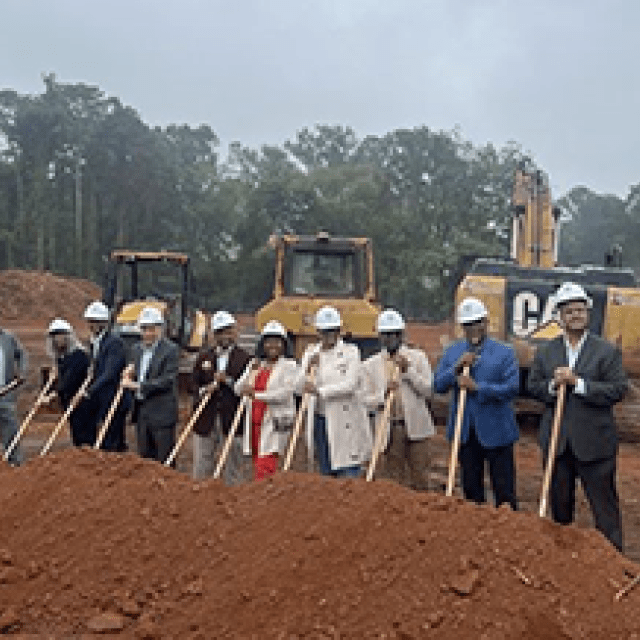Georgia’s 2022 legislative session was a reminder that it often takes a multi-year advocacy strategy to create change — particularly when it comes to affordable housing. At the end of this year’s session, we celebrated long-fought wins as we gear up for continued advocacy on critical issues that impact affordability across Georgia.
Here’s a review of our statewide policy work for 2022.
A key policy priority for the year was also a major win for protecting Georgia’s children against harmful lead exposure. After years of collaborative advocacy and extensive testimony to a House study committee, Georgia will update state law to match federal guidelines that define elevated blood lead levels in children and heighten the standard that triggers intervention to reduce lead hazards.
With the passing of House Bill 1355, children under six will be protected from lead exposure found in the interior and exterior of rental homes, schools and daycare centers, among other places common to young children. This measure called for an additional $1.8 million in funding to the Georgia Department of Health to implement changes. Governor Kemp signed this bill into law, and it will go into effect on July 1, 2022.
Improving protections for tenants in Georgia continues to be a priority for Enterprise and our partners across the state. Georgia is one of only 10 states without a written notice requirement prior to filing an eviction. House Bill 408 would require a seven-day written notice to tenants prior to an eviction, during which tenants would be allowed to pay overdue rent without the additional costs to both property owners and tenants that are connected to court filing costs and legal fees.
The bill would also address the consequences of an eviction filing on a tenant’s record, which can reduce or nearly eliminate quality housing opportunities in the future — even if the tenant pays the rent owed within that seven-day window. We have pushed this bill in prior legislative sessions and despite receiving sponsorship from respected legislators, we have yet to see it pass. Each year we see the coalition of advocates grow stronger around this issue. We look forward to learning from other measures that take time to build momentum and continue making the case for these protections during the next session.
Over the coming months, we are preparing to challenge harmful bills that have gained traction during this past session, despite not passing. We opposed two bills from the last session that criminalized the homeless community when encamped outside of certain locations and reduced state funding to local governments that do not enforce this law. House Bill 713 and Senate Bill 535 would create structured camping facilities with criminal penalties for those camped outside of those locations. Advocates for the unhoused community call these proposals untested, expensive, and potentially detrimental to efforts to create permanent housing solutions for those who are unhoused. A senate study committee on unsheltered homelessness was created in response to those bills through Senate Resolution 659. The focus of this study committee was to:
- Study unsheltered homelessness across Georgia and within the City of Atlanta
- Assess evidence for the success or failure of policies implemented to reduce street homelessness
- Solicit stakeholder input
- Develop recommendations on encampment bans, contracts with nonprofit organizations serving the homeless, and the necessity of new state laws dealing with homelessness.
Local leaders and organizations from across the state provided testimony to illustrate the challenges for Georgia’s unhoused population and barriers that persist, making it difficult to connect to resources. You can view the committee hearings here. A final report out on the senate committee’s recommendations are expected soon.
Finally, during the 2022 legislative session, we supported local government’s powers to regulate the permitting process for corporate-owned, single-family rentals. House Bill 1093 and Senate Bill 494 both sought to limit local regulation of these properties. Both bills were opposed by the Georgia Municipal Association and other local leaders. Corporate-owned single-family rental properties have been on the rise in metro-Atlanta and have been connected to rising housing costs and the exclusion of Black and minority families from the homeownership market. For context, corporate ownership accounts for 23% of single-family housing in the United States, but a massive 43% of single-family housing in metro-Atlanta.
In June of this year, the Atlanta Regional Housing Forum hosted government leaders and housing stakeholders in a panel discussion on the impact of large-scale investor-owned single-family homes in communities across the metro-Atlanta area. The forum featured guest speakers Jon Willis with the Federal Reserve Bank of Atlanta, Professor Brian An with Georgia Tech, and Professor Desiree Fields with the University of California, Berkley. All provided context for what has become a concern for moderate-income communities across the Sun Belt. Local leaders from Cobb County and the City of College Park provided first-hand accounts of their concerns with the growing investment model and deleterious impact on would-be first-time home buyers in affordable communities who find themselves competing with corporate bidders. The forum can be viewed here.
We look forward to beginning 2023 with advocacy and engagement for the upcoming legislative session. Our priorities will continue to focus on expanding resources for the development and preservation of affordable housing across the state, establishing more equitable conditions for low- and moderate-income renters and connecting unhoused Georgians with more resources that reduce homelessness. Continue to stay connected with us through our Newsletter to learn about our ongoing work.

